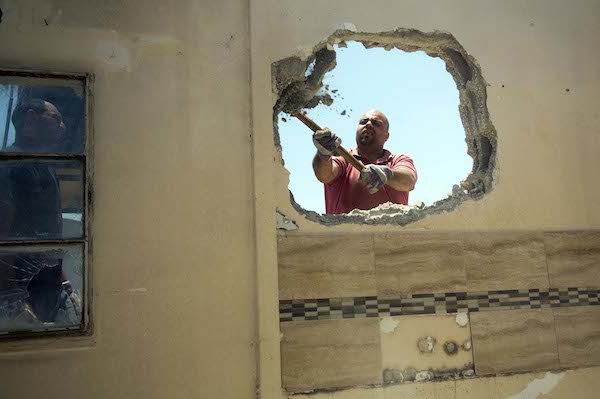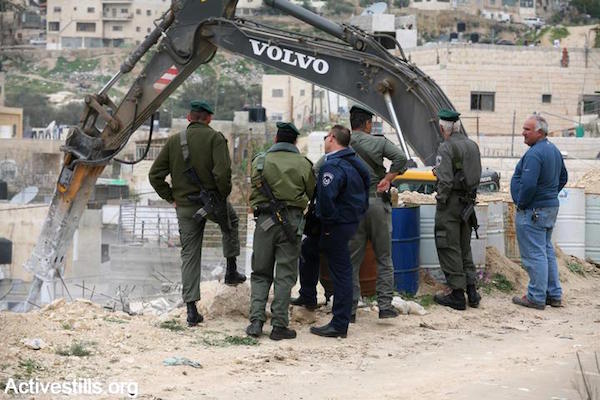Palestinians in East Jerusalem live in an ongoing state of limbo: either stay where they are and risk having any additions they make to their homes demolished, or move away and lose their residency status.
By Suleiman Maswadeh

It was a day I’ll never forget. I was 14, and my father invited me to “visit a friend” with him. I initially refused, but he insisted it was urgent — his best friend needed help, and we had to assist him.
I left our house in East Jerusalem feeling curious and peeved at the same time. As we made our way through the alleys of Jerusalem’s Old City, I realized where we were going, and when we arrived at our destination I saw that the building we’d come to had been partially demolished. Several people were crying and wailing, while others helped my father’s friend to clear out what remained among the destruction.
At first I thought a bomb had hit the area, or that a section of the house had caught fire and caused part of the building to collapse. But my father told me that the Jerusalem municipality had issued a demolition order against a new floor of the home that had been recently built, which left me with a pile of questions: Why was it forbidden to build? And if it’s forbidden, why did my father’s friend decide to build? And why on earth did he demolish his own house, rather than the municipality doing it?
There were no answers to these questions. I didn’t want to bug my father so I decided to help the family with what was left in the house. Yes, at the age of 14 I helped someone destroy their dream — a beautiful house into which he’d poured money, time and effort. I saw the owner of the house, his brother and a friend breaking up and removing what was left of the walls, with tears streaming from their eyes. I saw how agitated they were and so didn’t dare ask why they were doing it and not the municipality.
Many hours passed and the demolition was finally finished. Tiredness was etched on the faces of my father and the others, although not on mine. At the end of the day we consoled the owner of the house and went home. During the journey, I showered my father with all the questions I’d been bottling up during the demolition.

I started with the question that most concerned me: “If the municipality decided to demolish the house, why did [the home owner] demolish it himself?” My father answered that the municipality would have charged him a fortune — thousands of shekels — had they come to tear down the house themselves.
Then I asked why they’d had to demolish it in the first place, and why he had built the extra floor despite knowing that it’d eventually be destroyed. My father, smiling at my naivety, answered sadly: “He’s been trying to get a building permit for 10 years. He paid tens of thousands of shekels to lawyers, and tens of thousands in fines to the Jerusalem municipality. In the end, he decided to ignore everything and made a mistake.”
Unable to stay, and unable to leave
Today, I understand why the Israeli establishment behaves as it does. Palestinian residents of Jerusalem are banned from building or adding floors to their homes, but Jews are allowed to steal land and build entire neighborhoods on it — which the government then rubber-stamps and declares legal.
The building of the apartheid wall created a bizarre situation in which two places within Jerusalem’s municipal boundaries were nonetheless left “outside” it: Shuafat Refugee Camp and Kafr Aqab. Illegal construction goes on in both these places; the cramped conditions and the fact that no building inspections are carried out has led to dangerous structures, overcrowded and too high. Although they’re thought of as part of Jerusalem, both places are effectively abandoned territory.
There are no recreational areas in Shuafat Refugee Camp or Kafr Aqab, no community centers, football pitches or fitting schools. Residents pave the roads themselves and out of their own pockets, crime is spreading like a cancer and drugs are sold like chocolate. The streets are overflowing with trash and sewage, and children play among the dirt and pollution. But we’re talking about Palestinians, so who cares?
For now Jerusalemites prefer to rent a home in Beit Hanina or Shuafat (the neighborhood, not the refugee camp). They know that if they decide to live in a quieter area with fewer home demolitions but that are not considered part of Jerusalem, such as A-Ram or Anata, the government and the national insurance agency will pursue them and revoke their Jerusalem residency status. With that, they will lose all the benefits that come with residency — budgetary allowances for their kids, medical services that are better than what’s on offer in the West Bank, etc. And so, Palestinians are faced with two choices: lose their residency or have their homes demolished.
Ultimately, the government and the municipality want to reduce the presence of Arabs in the city and turn its populace into a majority Jewish one. At the same time, Jerusalem’s Arab residents live in daily fear of losing their means of support and status as residents. They cannot display any opposition because they know all too well that the municipality and the government have got them in a vise. And so, existence becomes impossible.
Suleiman Maswadeh is an activist who studies political science and communications. This article was first published in Hebrew on Local Call. Read it here. Translated by Natasha Roth.
